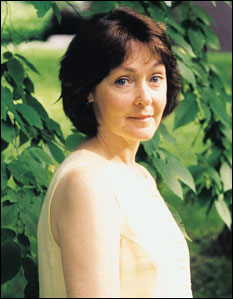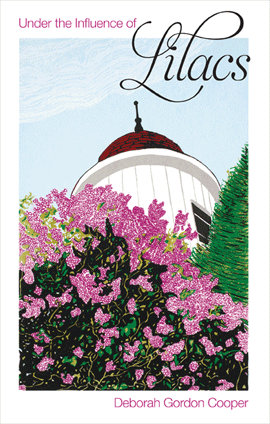The Key Dissolving in the Palm
Poet Connie Wanek offers an eloquent response to the deeply felt, resonant poems found in a new collection by Duluth's Deborah Gordon Cooper, "Under the Influence of Lilacs," just released by Clover Valley Press.

The lilacs are in full bloom, as if on cue. Duluth’s Deborah Gordon Cooper is reading tonight from her new book of poems, Under the Influence of Lilacs, and people are streaming into the Congregational Church on Superior Street for the event. Local folk hero, Sara Thomsen will also sing during the program, and to add to the pleasures of the evening, upon entering the the church, attendees are greeted by foyer tables full of fresh rhubarb bars and coffee, strawberries and chocolate truffles — and vases of fragrant lilacs.
Charlene Brown, who founded Clover Valley Press in 2007 to “celebrate the spirit of women in our region,” will introduce Cooper this evening. A few weeks ago, Brown had the satisfaction of seeing one of her offerings, Ellie Schoenfeld’s book of poems, The Dark Honey, win the Northeastern Minnesota Book Award. Cooper’s is the second volume of poetry from the young press.
Under the Influence of Lilacs includes selections from Cooper’s previous books and chapbooks, along with thirty new poems. Its cover features a lyrical fine art print of lilacs against a circular white turret, as might be found on the east hillside of Duluth among the century-old, formerly grand homes now broken into four-plexes. The screenprint is the work of Cooper’s husband Joel, with whom she has collaborated many times at exhibitions throughout the Midwest. She also belongs to a long-established writing group, whose members she thanks in the acknowledgments; in fact, one of the sections of her new book is comprised of poems that appeared in a collection this group published together with Calyx Press in 2005.
“I love the creative synergy of collaboration,” she explains. “There is something wonderfully expansive about it, and it stretches me in new directions. Writing in response to one of Joel’s images offers me a fresh ‘jumping-off’ place, and when he does a print for one of my poems, I can ‘see’ my poem through his eyes.”
Tonight, Sara Thomsen will perform a song she wrote with lyrics by Cooper.
Though she has written since childhood, Deb Cooper began writing in earnest while serving as a hospice chaplain. At the time, she says, she started to keep a journal to reflect on her experiences, and “every entry was a poem.” Now retired from hospice work, she teaches writing classes and conducts workshops on the ways poetry and spirituality overlap. It’s fair to say that her audience tonight needs no convincing on that front; I suspect those here already believe poems can not only be good, but do good.
For instance, the poem Tikkun (Hebrew for “mending the world; raising divine sparks,” according to the epigraph) describes the way one kindness begets another. Here are the first three stanzas:
The man with the overloaded grocery cart insists I go ahead of him. Did he see me looking at my watch? Even though I'm running late 10 I take the time to help the stooped woman wrestle a bag of dog food to her trunk. Arriving home, she calls her daughter on the phone, as if they'd spoken only yesterday, never mentioning the rift.
And so it continues: The narrative of the rest of the poem follows each recipient of generosity, with the implication is that good deeds have long, possibly infinite tendrils. This poem may perform its own “tikkun,” as reading it may stir the reader toward new acts of infectious good will.
The Congregational Church creates an ideal atmosphere for this evening’s reading, because the poems, while not overtly religious, contain a moral and spiritual seriousness. It’s a lofty space, and bright, but also intimate, and in fact it’s frequently used as a venue for musical performances. The windows are tall and clear, and beyond the glass a hedge of open lilacs is rustling. The carpet is bright red, as though rolled out in welcome.
Many of the poems in her new collection address the loss of loved ones, her parents and brother, and those personal details reverberate in the audience. After many last lines, listeners nod and sigh and murmur their assent. Yet even these poems are not unrelievedly sad. Here is Cooper writing about her father’s dementia:
Things I Didn’t Know I’d Miss
The way his hair
those last few years,
precisely Brylcreemed
through my childhood,
sprang from his head
like a flock of startled gulls.
Watching from the window,
before the wandering began,
when he could still find
his way around the pond,
circling for hours if
we didn't bring him in:
the day I realized he had put on
mother's lilac coat,
her white angora gloves.
The day, wanting to help
as I made lunch,
he set the table, using all the
family photographs as plates.
Ham-on-rye on his
Canadian Air Force face.
These are rueful observations, even comic, but as the title says, they are not simply a measure of what her father has lost. When someone you love dies, you miss even the difficulties that broke your heart.
Cooper’s poems feel scrupulously honest. We sense no artifice beyond the writer’s compression of hours, weeks, years of ordinary life into a few images that are as evocative as the scent of lilacs.
After Cooper reads a group of poems, Sara Thomsen steps to the microphone and sings, a cappella and then with her guitar. She has an engaging manner, and the songs are such that people (even reticent Minnesotans) sing along when the chorus rolls around. Think Pete Seeger, think Joan Baez — then add the gorgeousness of a warm alto voice. All evening Thomsen and Cooper will take turns delighting the crowd.

I read poetrythe way someone
somewhere else
reads scripture.
from Matins
I asked Deb Cooper about her Catholic background, and she said that though she seldom attends Mass anymore, she finds “community and spiritual guidance in a myriad of other ways.” She says, “I think that, even as a child, I connected readily with the sense of mystery and the mysticism that are a part of the Catholic tradition. In many ways, I see my poetry as an attempt to articulate what is essentially beyond words. At the same time, in that kind of hierarchical and sexist structure, I felt silenced.”
In the poem, Threshold, Cooper describes a time of crisis — the everyday kind one inevitably faces in life. “Some changes take you/ like an undertow.” Whatever religious guidance you received when you were young, you may now find “The key dissolving/ in your palm.” Those old skeleton keys, the ones on the big iron ring, are vanishing. I’m reminded of a Tomas Transtromer poem, Vermeer, which begins, “It’s not a sheltered world,” and ends, “And what is empty turns its face to us/ and whispers:/ ‘I am not empty, I am open.'” It’s not hard to imagine that many of these poems could help people during hard times.
As William Carlos Williams said in these famous lines from Asphodel, That Greeny Flower: “It is difficult/ to get the news from poems/ yet men die miserably every day/ for lack/ of what is found there.”
It would be wrong to leave the impression that Deb Cooper is all sadness and seriousness. She’s also very playful, in person and on the page. This night, on stage, she says she has written many poems set in the grocery store aisles (“a bit of gossip over grapes”), but will read only a handful of them tonight. The store where she shops, according to one of her poems, is the Jubilee, which in Christian tradition is “a special year for the remission of sins and universal pardon.” What could be more appropriate?
Toward the end of the reading, Cooper reveals that she sings in the Echoes of Peace Choir, and declares it to be “the best choir ever!” Big cheers. Evidently there are a number of choir members in the audience tonight. Also, she brings to our attention that two of her grandchildren are in the fourth row, and Cooper says, “If you think my grandchildren were terrific listeners…” And the little ones squirm and blush as sixty pairs of eyes turn in their direction, clapping and smiling.
During the book signing that follows the reading, I notice that several people standing in line have half a dozen copies each in their arms. Cooper’s new collection is the kind you want to pass around. It’s a book that welcomes readers and offers solace, hope, companionship, and hard-won wisdom — and the scent of lilacs.
Related events: Saturday, June 26, noon-1 pm. Deborah Gordon Cooper will sign copies of Under the Influence of Lilacs at Northern Lights Books & Gifts, 307 Canal Park Drive, Duluth.
Saturday, July 24, 5-6 pm. Clover Valley Press poets Deborah Gordon Cooper and Ellie Schoenfeld will be featured at a Saturday Salon at Drury Lane Books, 12 E. Wisconsin St., Grand Marais, MN.